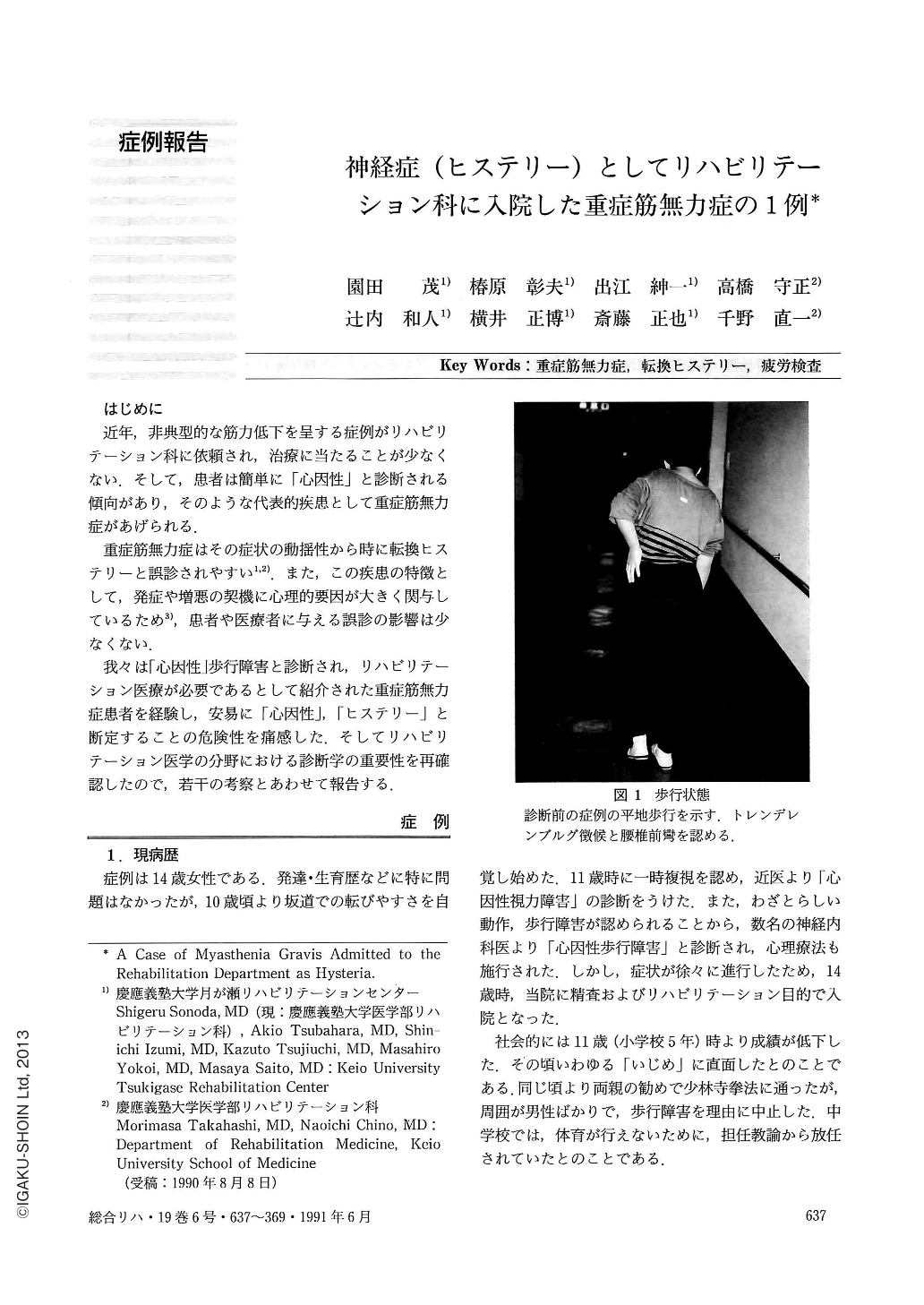- 著者
- 園田 茂 椿原 彰夫 出江 紳一 高橋 守正 辻内 和人 横井 正博 斎藤 正也 千野 直一
- 出版者
- 医学書院
- 雑誌
- 総合リハビリテーション (ISSN:03869822)
- 巻号頁・発行日
- vol.19, no.6, pp.637-639, 1991-06-10
はじめに 近年,非典型的な筋力低下を呈する症例がリハビリテーション科に依頼され,治療に当たることが少なくない.そして,患者は簡単に「心因性」と診断される傾向があり,そのような代表的疾患として重症筋無力症があげられる. 重症筋無力症はその症状の動揺性から時に転換ヒステリーと誤診されやすい1,2).また,この疾患の特徴として,発症や増悪の契機に心理的要因が大きく関与しているため3),患者や医療者に与える誤診の影響は少なくない. 我々は「心因性」歩行障害と診断され,リハビリテーション医療が必要であるとして紹介された重症筋無力症患者を経験し,安易に「心因性」,「ヒステリー」と断定することの危険性を痛感した.そしてリハビリテーション医学の分野における診断学の重要性を再確認したので,若干の考察とあわせて報告する.
- 著者
- 辻内 和人 近藤 健 野田 幸男 千野 直一
- 出版者
- 社団法人日本リハビリテーション医学会
- 雑誌
- リハビリテーション医学 : 日本リハビリテーション医学会誌 (ISSN:0034351X)
- 巻号頁・発行日
- vol.29, no.11, 1992-11-18
1 0 0 0 OA 認知機能障害と情動障害に対する早期アプローチが有効であった外傷性脳損傷の2症例
- 著者
- 小林 由紀子 赤星 和人 原 行弘 辻内 和人 岡村 陽子
- 出版者
- 社団法人 日本リハビリテーション医学会
- 雑誌
- リハビリテーション医学 (ISSN:0034351X)
- 巻号頁・発行日
- vol.42, no.11, pp.778-782, 2005 (Released:2006-09-22)
- 参考文献数
- 16
In the rehabilitation of traumatic brain injury, emotional disorders such as a quick temper, depression and irritability are a critical problem, as well as cognitive dysfunctions such as impairment of attention and memory. In addition, it is rare that they are completely isolated and cognitive dysfunction and emotional disorders tend to have an influence on each other. In other words, the stress caused by cognitive dysfunction induces an aggressive emotional disturbance, and unrest of mood accelerates cognitive dysfunctions such as memory and judgment. Therefore, it is important to consider their emotional states when we start rehabilitation for patients with traumatic brain injury. We had a valuable experience in early rehabilitation of two patients with traumatic brain injury. We had very good results by thinking about the emotional disorder first, and thereafter training for the cognitive dysfunction. Case 1, a young male, was a computer programmer. After suffering a traumatic brain injury, he could not think logically and he had many emotional problems with his mother. Case 2 was a middle-aged housewife. She became depressive and negative towards rehabilitation, because of her memory problems post traumatic brain injury. We administered a rehabilitation regime which attached great importance to treating the emotional disorders affecting these two patients. As a result, in the early phase, we were able to make progress in cognitive rehabilitation as well as improving their emotional problems by our intervention, and they overcame their cognitive dysfunctions and resumed their normal daily lives in a month.

